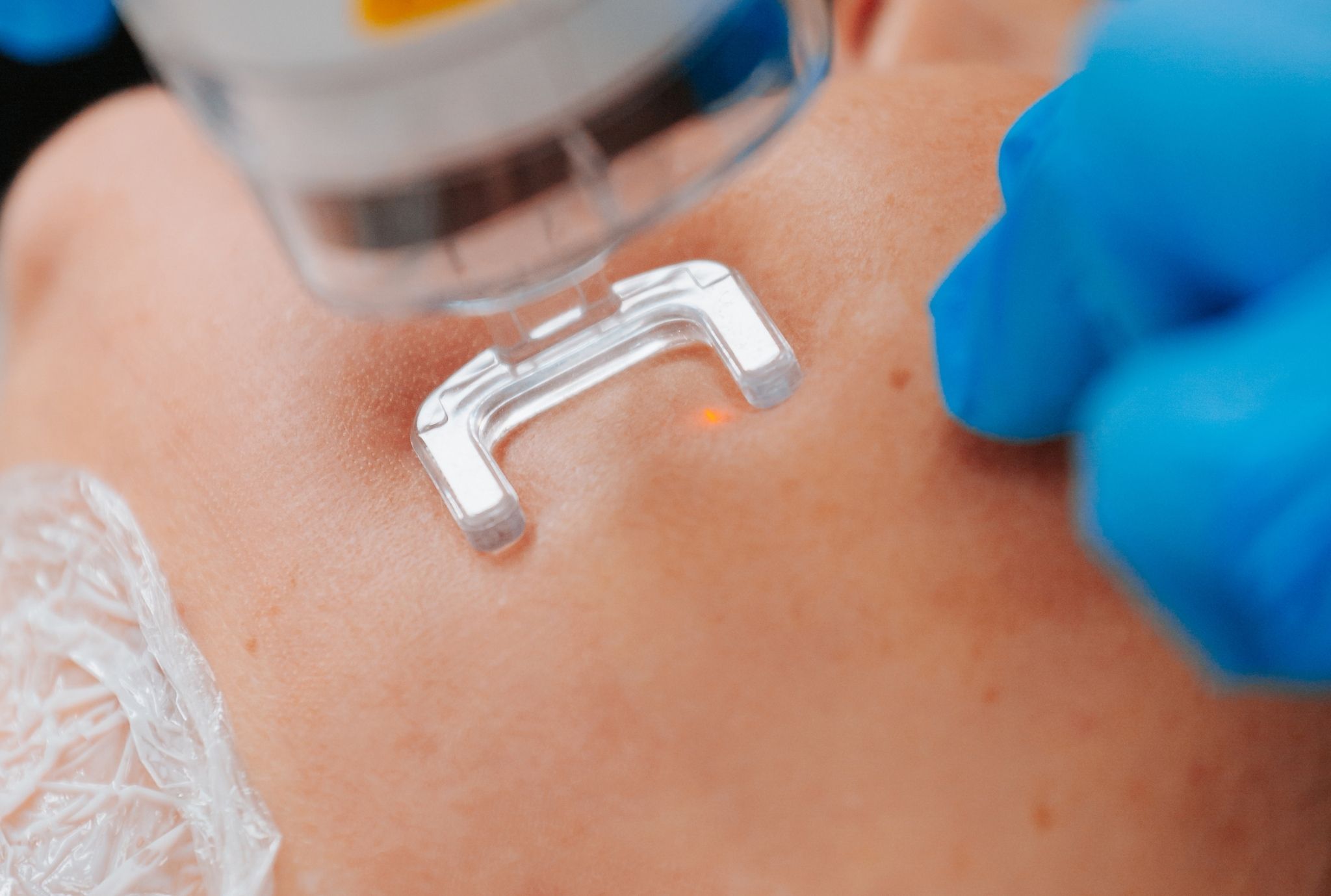Melasma is a chronic skin pigmentation disorder that occurs predominantly due to hormonal changes, coupled with sun exposure. It often appears in young women who have a brownish skin tone.
While several topical creams are prescribed for melasma, it is a particularly difficult condition to treat with creams alone. This is because it usually involves deep skin cell involvement and a complex interplay of causative factors that make it challenging to treat.
However, laser treatments available today offer an advanced and effective solution to treat melasma, reducing the recurrence and relapse.

What are the different types and symptoms of Melasma?
There are primarily 3 types of melasma (based on the depth of melanin deposition in the skin):
Dark patches with well-defined borders limited to the skin surface. It responds well to treatment.
Appears as light brown or bluish-grey patches with blurry borders. These extend deeper into the skin, making them resistant to treatment.
This is the most common type and shows features of both epidermal and dermal melasma.
Common symptoms of melasma include:
- Change in skin colour
- Pigmented patches on the cheeks, forehead, nose and upper lip
- The dark patches are usually symmetrical (occuring on both sides of the body)
Risk factors for Melasma
You are more likely to develop melasma if you:
- Are a woman between 20 and 40
- Have a medium or dark skin tone
- In women of Latin, Native American, or Asian heritage
- Have a family history of the condition
Why Laser Treatment for Melasma?
Lasers are an excellent option to treat melasma, especially when conventional treatments with topical creams and chemical peels are not working. They also offer several benefits, making them an effective treatment option for people with resistant or recurring melasma:
Due to their precision, laser treatments can precisely target the pigmented areas without affecting the surrounding healthy skin.
Laser treatment is known to stimulate collagen production, which in turn improves skin firmness and texture, giving you younger-looking, radiant skin.
Since laser treatment for melasma is a non-invasive procedure, most people require minimal downtime.
Types of Laser Treatments for Melasma at Hortman Clinics
At Hortman Clinics, we offer cutting-edge, FDA-approved laser therapy for melasma in Dubai, ensuring safety, comfort, and outstanding results. These include:
It uses ultra-short pulses to break up melanin without heat damage. It is gentle, fast, with minimal downtime and ideal for both epidermal and some dermal melasma.
Common devices for this purpose:
PicoSure
PicoGenesis
PicoWay
It targets deep pigments and therefore, is effective for stubborn melasma, especially in darker skin tones.
This laser creates micro-injuries to trigger collagen renewal and pigmentation repair and treats both pigment and texture irregularities. It is effective for resistant melasma.
This laser offers precise, multi-wavelength technology that makes it effective even for deep, stubborn melasma.
In many cases, a combination of treatments including PRP, laser and other topical applications may be recommended, tailored to skin type and pigment severity.
What to expect during your Laser Session for Melasma?
If you are all set to undergo a laser treatment for melasma at Hortman Clinics, the leading luxury aesthetic and wellness centre in Dubai, here’s what you can expect:
Before the procedure:
- Our expert dermatologist will assess your skin type, discuss your medical history, and examine the depth and distribution of melasma.
- The specialist will create a personalised treatment plan based on your skin’s needs and the laser technology best suited for your pigmentation pattern.
During the laser procedure:
- The treatment area is gently cleansed.
- Protective eyewear is provided for safety.
- The laser handpiece is passed over the affected areas, delivering light energy to break up pigment.
- You may notice a mild warmth or tingling sensation.
A typical laser session takes about 15–30 minutes, depending on the size and number of treatment areas.
After the procedure:
- The treated skin may appear slightly red or feel warm, similar to a mild sunburn, for a few hours.
- Apply broad-spectrum sunblock regularly to prevent recurrence or worsening of pigmentation.
- Avoid harsh products and exfoliants for several days.
- Moisturise adequately to support skin healing.
- Refrain from hot showers, saunas, or heavy workouts for 24–48 hours.
Who is a good candidate for Melasma Laser Treatment?
Laser therapy for melasma in Dubai is recommended for the following individuals:
- With persistent, treatment-resistant melasma that has not responded to other therapies like topical creams or chemical peels
- Who experience melasma during pregnancy and do not plan on having more children
- Seeking quicker results
Results and Recovery
After the first laser session for melasma, you will begin to see some improvement. However, it will take 3 to 4 sessions, spaced 30 days apart, for evident results. You will see complete results 3 to 6 months after your laser procedure.
Since melasma is a chronic condition, it may come back after certain intervals. So, your dermatologist will most likely recommend follow-up and maintenance sessions to help keep melasma pigmentation under control.
After a laser treatment for melasma, many people may experience some minor side effects, which typically resolve on their own. These include:
- Redness
- Mild swelling
- Itching
- Burning or stinging sensation
- Blisteres (in a few cases)
During your recovery, it is important to ensure adequate sun protection. Here are a few things you can do to protect your skin from sun exposure:
- Wear long-sleeved shirts and pants/skirts
- Avoid stepping out during the afternoon
- Use sunscreens with high UV protection all year round
- Avoid tanning beds and salons
Why Choose Hortman Clinics for Melasma Laser Treatment?
Your treatment is overseen by highly experienced dermatologists and certified laser specialists who specialise in pigment disorders like melasma.
We use advanced, FDA-approved laser treatments in Dubai, such as PicoSure®, Q-Switched Nd: YAG, and StarWalker® for safe and effective pigmentation reduction.
Each melasma treatment plan is tailored based on your unique skin type, pigment depth, and treatment goals for optimal outcomes.
Receive personalised post-treatment guidance, including professional skincare recommendations to maintain long-term results.
Relax in a luxurious, medically advanced clinic environment designed to meet your aesthetic and therapeutic needs with top-tier care.
Takeaway!
After the first laser session for melasma, you will begin to see some improvement. However, it will take 3 to 4 sessions, spaced 30 days apart, for evident results. You will see complete results 3 to 6 months after your laser procedure.
Since melasma is a chronic condition, it may come back after certain intervals. So, your dermatologist will most likely recommend follow-up and maintenance sessions to help keep melasma pigmentation under control.
After a laser treatment for melasma, many people may experience some minor side effects, which typically resolve on their own. These include:
HORTMAN CLINICS NEWS
Related News
We are here for you. Always.
Everything we do is tailored to your needs, this is why we take our time to take care of you and answer all your questions.




